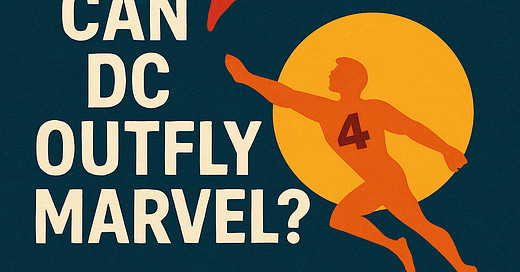Superman and the New Superhero Stakes
Superman opened to over $96 million Worldwide on its opening day Friday, signaling a strong resurgence of audience interest in the DC Universe. With a domestic debut between $115 and $120 million, it is on track to outpace Marvel’s Thunderbolts and Captain America: Brave New World, both of which struggled to break the $415 million global threshold.
The global estimates figure of $210 million+ signals strong performance overseas, although major market numbers are still pending.
For Warner Bros. Discovery, this is not just about winning a weekend. This is a chance to reboot a franchise that has been defined more by stumbles than triumphs over the past decade. A successful Superman film gives them leverage for spin-offs already in motion, including a Supergirl movie and an HBO Max series centered on Green Lantern. Characters like Mr. Terrific, newly introduced in this film, provide Marvel-style connective tissue to launch a new narrative universe.
By contrast, Marvel’s 2025 slate has not inspired the same kind of optimism. Fantastic Four: First Steps may carry long-term narrative importance, but industry projections are cautious. A $100 to $155 million opening would still place it behind Superman, signaling that audience fatigue or brand confusion may be harder to shake for Marvel than anticipated.
James Gunn and the Future of DC
James Gunn is not just a filmmaker. He is now the co-architect of the new DC Universe. As co-chairman and co-CEO of DC Studios, he has been tasked with restoring credibility and cohesion to a franchise that has failed to replicate Marvel’s model of interconnected storytelling.
Gunn’s reputation for turning niche characters into cultural icons was cemented with Guardians of the Galaxy, which turned a relatively unknown team into a billion-dollar franchise. Now, he is applying that formula to DC. His version of Superman leans into optimism and emotional relatability, in contrast to the brooding versions seen in Man of Steel or Batman v Superman.
What makes Gunn valuable is not just his creative direction, but his ability to integrate new characters with legacy icons. Superman is no longer just about Kal-El. It is a testing ground for a broader cinematic universe that includes Hawkgirl, Mr. Terrific, and Green Lantern. If Superman succeeds, it resets the narrative. If it fails, the entire structure of the new DCU could collapse before it has a chance to expand.
The Bigger Picture: Streaming, Spin-offs, and Financial Strategy
I agree with media analyst Dan Rayburn, Superman’s success is only one piece of a much larger puzzle. The real story is financial. Warner Bros. Discovery is undergoing a structural transformation. The company has already taken a $9.1 billion write-down on its linear TV assets and is preparing to spin them off into a separate entity. This is not just a rebrand. It is a clean break intended to isolate legacy cable losses from the streaming and studio businesses.
WBD is repositioning itself as a global DTC player, with its Max platform soon reverting to the HBO brand. Simultaneously, the company is increasing its ad load on Max and rolling out globally. These moves aim to improve margins and attract advertisers, even as cord-cutting accelerates and linear revenue evaporates.
Disney, meanwhile, is taking a different path. Rather than spin off its legacy networks, it has decided to retain ABC and related assets, believing that bundled offerings like the upcoming ESPN-Disney+-Hulu package will deliver value through integration. But Disney’s DTC division has already lost over $11 billion prior to reaching profitability. While it reported a $336 million profit in Q1, advertising pressure remains intense. CPMs are down and new inventory from Prime Video and YouTube is increasing competition.
The key point here is that the industry’s health cannot be judged by opening weekend numbers or headline mergers. It depends on how well these companies manage costs, balance revenue from subscriptions and ads, and transition away from legacy infrastructure. In that context, Superman is more than a film. It is a strategic asset in a high-stakes reconfiguration of the entertainment " Attention Economy".
- Maureen




